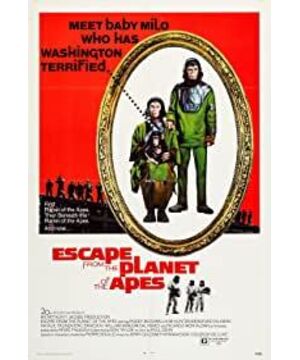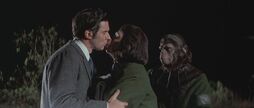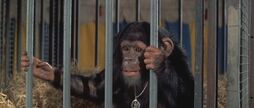Planet of the Apes " series consists of five parts, namely "Planet of the Apes" (1968),
"Beneath the Planet of the Apes" (1970),
"Escape from the Apes (1970) Escape from the Planet of the Apes" (1971)
"Conquest of the Planet of the Apes" (1972)
"Battle for the Planet of the Apes" (1973) This
film was remake from The fourth part of the five-part series, "Conquering the Ball of the Apes", has roughly the same story structure. It is all about a clever ape named "Caesar" who planned and led the counterattack against mankind, making the ape the ruler of the earth. But this remake is not a simple copy. Comparing the old and new editions, you can find a lot of interesting details worthy of fun.
The most obvious difference is the title, the new version was renamed "Rise of the Planet of the Apes". Audiences familiar with new century science fiction films must be impressed by the title "rise of". In order to show the strength of the protagonist of the movie, Hollywood filmmakers took the trouble to make them breathtakingly "rise" on the screen: "Terminator 3: The Rise of the Machine", "Fantastic Four: The Rise of the Silver Shadowman", "Special Forces: The Rise of Cobra", "Batman: The Rise of the Dark Knight"...and this time the monkeys This "rise" trend has its own ambition to match the above-mentioned science fiction blockbusters. The old version of "Conquest of the Planet of the Apes" is really clumsy in comparison. Conquest? Who conquered whom? Did not say clearly. At a glance, the "Apes", who thought they were ruled by apes, had been conquered, which was totally different from the original intention.
"Conquering the Ball of the Apes" has a very strange social background: in 1983 (considering the filming time, this is already sci-fi), the United States under totalitarian rule slaughtered all cats and dogs, and apes became human pets and slaves. The cruelty of mankind aroused dissatisfaction among the apes, and in 1991, he rebelled under the leadership of the brilliant "Caesar". The social background of "The Rise of the Apes" is very realistic. The film does not contain any elements with obvious fantasy meaning, and the depiction of medical testing institutions and equipment is very plain, deliberately downplaying the nature of the film as a science fiction film.
Starting from the political environment and world pattern of the old version of the film, it is natural to explain the reasons for the creation of an authoritarian future in the film, but no matter what, similar themes are no longer applicable today. Environmental protection and animal protection have become a topic of increasing concern to the public today (look at the high ratings of "Homeland" and "Dolphin Bay"), so the new version shifts its focus to such topics, which is one of the empathy for the audience. Remember the coup. If the old version uses a future full of fear and curiosity as a gimmick, then the new version is to win the audience with the values of popular morality, and use stormy attacks to dismantle all evil forces that challenge the bottom line of human conscience, even these evils. The forces are our kind, and the audience clap their hands and applaud. The same is science fiction, the new version is more "hard", more convincing, and more emotionally invested.
The depiction of "Caesar" is very different in the two editions. The Caesar of "Conquering the Apes" is a race that evolved after the nuclear explosion in the future. He has different talents and was born with wisdom that surpasses the same race or even humans. Hidden in the city, willing to be a human pet, until he witnessed human brutality, he couldn't bear to rise up. "The Rise of the Apes" did not agree with this surprisingly small genetic mutation, and replaced it with the fatalism that caused Xiaoqiang: humans did not hesitate to experiment with apes in order to study drugs. As a result, the drugs made the apes' IQ soar and caused humans to suffer.
From this point of view, it is the new version that has won by a big margin. In the 1970s, medical concepts such as genetic engineering and cell regeneration were still hypothetical. Editors and directors who wanted to make a fuss about this were just asking for trouble. It was hard to compile. Even if they were compiled, audiences who didn't understand it at the time would sneer at them. , Can only resort to time and space reincarnation, the spacecraft crash-landing; and now the highly developed medical and information smooth Internet has already made the audience no stranger to this. The technology setting can be more self-explanatory than the original version, and it can also be understood by the audience, although it is slightly different. Seriously, this is still a "pseudoscience" that satisfies the needs of the plot. Moreover, it is also an interpretation of karma. The original version of the ape riot caused by human cruelty is really unconvincing, while the new version of animal experiments is a much more reasonable opportunity. After all, in the world we can see, slaves are abused. The phenomenon is almost extinct, but experimenting with animals is a large number of facts in the scientific community.
The most critical difference between the two editions is the climax at the end. The "Caesar" in "Conquer the Apes" raised his arms. The monkeys followed and fought with the armed police. After the street fire of the young and Dangerous, all the soldiers and police were annihilated. The apes were victorious. As for the follow-up of human beings. There is almost no explanation as to how apes and monkeys gradually ruled the earth, and only a glimpse of light is mentioned in the sequel. "The Rise of the Apes" played a little trick in propaganda: in the trailer, the battle between apes and police cars and helicopters was heavily rendered. It was misunderstood that it was just a copy of the old version and upgraded the scene, but in fact, in the plot, The strategic significance of this great apes war is very low. It is just the struggle of the monkeys to "go home", and at the end they briefly explain the reason for the ultimate defeat of mankind: the spread of toxic substances in the laboratory.
This is probably the most advanced aspect of the new version, because it really clarifies why humans will fail in this battle of disparity in strength, and eventually become pets and slaves of apes. Instead of not watching the sequel or paying attention to the subtle retrospectives in the sequel like the old version, audiences, especially those who have been baptized by films such as "Independence Day" and "Transformers", can easily fall into this illusion: Fists and cold weapons defeated human civilization, and then questioned: Is it possible that the aliens and robots that can easily destroy the city can not be compared with a group of unarmed apes? Sincere remakes will definitely work to repair major shortcomings in the original version. At this point, the new version does a good job, and the explanation is clear.
The "global poisoning" arrangement is also smarter than the old version of lunatics and the chaos and decline caused by nuclear war. The latter is obviously influenced by the pattern of the times and aims to reflect a panic at the time, but it appears to be pieced together because it is not necessarily related to the rise of the apes (a dictatorship must trigger a nuclear war?). The former gives people a sense of inevitable inevitability. The story originated from drug experiment, and finally the drug experiment, a perfect echo from end to end, is embarrassing.
Although the apes in the new version have more flexible actions and stronger combat effectiveness under the advanced movie special effects, they require significantly less effort to conquer the world-the drugs developed by humans do most of them. Work. After 40 years, the apes who rebelled on the screen again have more brains and strategic planning, and are more efficient. They have achieved faster victory in exchange for smaller physical conflicts. Their evolutionary speed is surprising. Faintly worried, maybe the next time we see a similar scene, it won't be in the theater, Amen.
Original: Text/Fang Yunan
View more about Escape from the Planet of the Apes reviews











